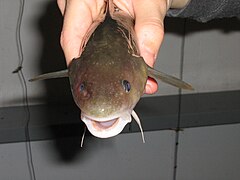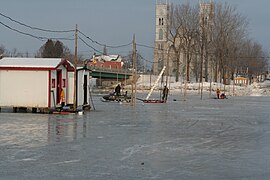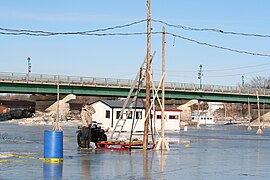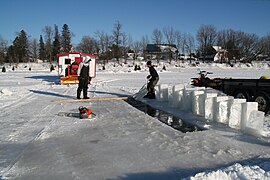Microgadus tomcod
| Microgadus tomcod | |
|---|---|

| |
| Scientific classification | |
| Domain: | Eukaryota |
| Kingdom: | Animalia |
| Phylum: | Chordata |
| Class: | Actinopterygii |
| Order: | Gadiformes |
| Family: | Gadidae |
| Genus: | Microgadus |
| Species: | M. tomcod
|
| Binomial name | |
| Microgadus tomcod (Walbaum, 1792)
| |
| Synonyms | |
Microgadus tomcod Walbaum. — Poulamon atlantique, Petit poisson des chenaux, poulamon, petite morue, loche. — (Atlantic tomcod, Tomcod, Frostfish, Tommycod), is a type of cod found in North American coastal waters from the Gulf of St. Lawrence, Estuary of St. Lawrence River and northern Newfoundland, south to Virginia.[2]
- Microgadus tomcod Walbaum. — Poulamon atlantique, Petit poisson des chenaux, poulamon, petite morue, loche. — (Atlantic tomcod, Tomcod, Frostfish, Tommycod).
Tomcod fishing
[edit]
The fishing season of the tomcod varies by location—one known example is the Sainte-Anne River in Quebec.
Winter visitor, the Microgadus tomcod spawns between mid-December and the end of January mainly up to the Sainte-Anne and Batiscan rivers, in the Estuary of St. Lawrence River.[2]
- In Sainte-Anne-de-la-Pérade another village rises
-
Strengthening ice by watering
-
Installation of the electrical network
-
Electrical poles and wires
-
Hole and ice blocks
-
Resurfacing a cabin with ice, which will be covered with snow
Science
[edit]A bimonitoring program tracked hormone levels of Atlantic tomcod caught near Miramichi and Kouchibouguac in 1993 and 1994, demonstrating that the preparatory period for spawning began in September[4] with maximal steroid levels in November, and spawning took place from late December to January. The town of Sainte-Anne-de-la-Pérade is notable for its fishing village built on the frozen waters of the Ste-Anne, playing host to the scores of fishermen visiting the town to fish for the species.
After General Electric dumped polychlorinated biphenyls (PCBs) in the Hudson River from 1947 through 1976, tomcod living in the river were found to have developed an increased resistance to the compound's toxic effects. Scientists identified the genetic mutation that conferred the resistance, and found that the mutated form was present in 99 percent of the tomcods in the river, compared to fewer than 10 percent of the tomcods from other waters.[5]
This species can reach a length of 38.1 cm (15.0 in).[6]
Taxonomy
[edit]The Atlantic tomcod is one of two species in the Microgadus genus, the other being Microgadus proximus, the Pacific tomcod.
References
[edit]- ^ NatureServe (2013). "Microgadus tomcod". IUCN Red List of Threatened Species. 2013: e.T202405A18236770. doi:10.2305/IUCN.UK.2013-1.RLTS.T202405A18236770.en. Retrieved 20 November 2021.
- ^ a b c "Poulamon atlantique, Atlantic tomcod". Gouvernement of Quebec (in French). Ministry of the Environment, the Fight against Climate Change, Wildlife and Parks. October 2024. Retrieved 22 October 2024.
The Atlantic tomcod spawns between mid-December and the end of January. Reproduction takes place in fresh water, under the ice. Spawning takes place on sand or gravel bottoms, at the foot of rapids or in gaps in the frazil ice.
- ^ "Ice fishing in Mauricie: Places to ice fish in winter" (in French). Mauricie tourism. Retrieved 29 October 2024.
... the fish (tomcod) are always there and in large numbers day and night! Fishing for small fish in the Chenaux is a family event not to be missed in winter, with a host of free activities surrounding fishing such as sliding, the ice rink and tram rides.
- ^ Williams, PJ; Courtenay, SC; Wilson, CE (August 1998). "Annual sex steroid profiles and effects of gender and season on cytochrome P450 mRNA induction in Atlantic tomcod (Microgadus tomcod)". Environmental Toxicology and Chemistry. 17 (8): 1582–1588. doi:10.1897/1551-5028(1998)017<1582:ASSPAE>2.3.CO;2.
- ^ Welsh, Jennifer (February 17, 2011). "Fish Evolved to Survive GE Toxins in Hudson River". LiveScience. Retrieved September 26, 2017.
- ^ Froese, Rainer; Pauly, Daniel (eds.). "Microgadus tomcod". FishBase. February 2016 version.
External links
[edit]


![Frozen on the ice of the Sainte-Anne River, at the door of a fishing hut[2][3]](http://upload.wikimedia.org/wikipedia/commons/thumb/d/d4/Glace_016.jpg/270px-Glace_016.jpg)






